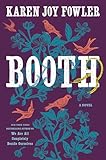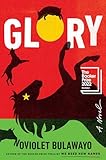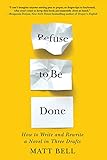Here’s a quick look at some notable books—new titles from Allegra Hyde, NoViolet Bulawayo, Matt Bell, and more—that are publishing this week.
Want to learn more about upcoming titles? Then go read our most recent book preview. Want to help The Millions keep churning out great books coverage? Then become a member today.
Eleutheria by Allegra Hyde
Here’s what Publishers Weekly had to say about Eleutheria: “Hyde chronicles the foibles of a would-be utopian movement led by climate change activists in her fiery and engrossing debut novel (after the collection Of This New World). Willa Marks is raised in the woods in New Hampshire by paranoid parents who fear the end is near, and grows up with a contrasting disposition. Ever the idealist, she believes ‘the planet… was not poised to betray us.’ At 18, in Boston, Willa meets Sylvia Gill, a renowned Harvard professor whom she soon reveres but who spurns Willa. On the brink of losing hope, Willa comes across a book called Living the Solution, and learns it was written by the founder of Camp Hope, ground zero for ‘ecowarriors’ on the island of Eleutheria in the Bahamas. With fantasies of gaining Sylvia’s approval, Willa flies there to join the movement, which for the moment is staying underground. She soon learns the public launch is delayed, Camp Hope’s leader is missing, and others find her an intrusion. But Willa insists on being accepted and strives to keep operations running, realizing too late the price of it all. Exquisite prose and keen insights into the limits of idealism and activism add to the propulsive narrative. This is a worthy entry into the growing field of environmental fiction.”
Booth by Karen Joy Fowler
 Here’s what Publishers Weekly had to say about Booth: “The Booth in the title of Booker-shortlisted Fowler’s razor-sharp latest (after We Are All Completely Beside Ourselves) is John Wilkes Booth, Abraham Lincoln’s assassin. The author approaches ‘Johnny’ obliquely, through his family circle in Maryland. Booth’s father, Junius Brutus Booth, is a Shakespearean actor whose masterly Richard III and ‘towering genius’ are offset by episodes of ‘mad freaks.’ (He’s also a drunken failure of a father.) Cycles of depression triggered by Junius’s endless indiscretions and prolonged absences define Booth’s mother. Three siblings in this theatrical family are central: eldest sister Rosalie is ‘painfully shy’ and has scoliosis; brother Edwin, like Junius a ‘star’ actor, is prone to drink; and beautiful sister Asia is ‘strong and stormy,’ ‘ice and iron.’ Others, such as the Halls—a Black family, some of whom are free and others enslaved—also play parts. All illuminate the depressingly bizarre rearing of Johnny and the disgruntled, attention-seeking actor he becomes. As Congress passes the 13th amendment to abolish slavery and General Lee surrenders, Booth’s acting career falters and his Southern sympathies rise, building toward the fateful night that will forever define him and his family. Fowler sets the stage in remarkable prose, and in her account of the Booth family’s move from rural Maryland to Baltimore in 1846 (‘Instead of frogs, choruses of drunks sing on the street after dark. Instead of birdcalls, factory whistles’), she subtly conveys the depth of her characters, noting that Johnny, at seven, takes on the ‘city name’ Wilkes. Throughout, the nuanced plot is both historically rigorous and richly imagined. This is a winner.”
Here’s what Publishers Weekly had to say about Booth: “The Booth in the title of Booker-shortlisted Fowler’s razor-sharp latest (after We Are All Completely Beside Ourselves) is John Wilkes Booth, Abraham Lincoln’s assassin. The author approaches ‘Johnny’ obliquely, through his family circle in Maryland. Booth’s father, Junius Brutus Booth, is a Shakespearean actor whose masterly Richard III and ‘towering genius’ are offset by episodes of ‘mad freaks.’ (He’s also a drunken failure of a father.) Cycles of depression triggered by Junius’s endless indiscretions and prolonged absences define Booth’s mother. Three siblings in this theatrical family are central: eldest sister Rosalie is ‘painfully shy’ and has scoliosis; brother Edwin, like Junius a ‘star’ actor, is prone to drink; and beautiful sister Asia is ‘strong and stormy,’ ‘ice and iron.’ Others, such as the Halls—a Black family, some of whom are free and others enslaved—also play parts. All illuminate the depressingly bizarre rearing of Johnny and the disgruntled, attention-seeking actor he becomes. As Congress passes the 13th amendment to abolish slavery and General Lee surrenders, Booth’s acting career falters and his Southern sympathies rise, building toward the fateful night that will forever define him and his family. Fowler sets the stage in remarkable prose, and in her account of the Booth family’s move from rural Maryland to Baltimore in 1846 (‘Instead of frogs, choruses of drunks sing on the street after dark. Instead of birdcalls, factory whistles’), she subtly conveys the depth of her characters, noting that Johnny, at seven, takes on the ‘city name’ Wilkes. Throughout, the nuanced plot is both historically rigorous and richly imagined. This is a winner.”
The Last Suspicious Holdout by Ladee Hubbard
 Here’s what Publishers Weekly had to say about The Last Suspicious Holdout: “Hubbard’s sweeping linked collection (after The Rib King) follows a Southern Black community through decades of inequities and unrest. In ‘Henry,’ set in 1993, the title character balances running a bar with advocating for his brother, Leon Moore, whose murder conviction eight years earlier was questioned by members of the community. A newspaper article once called their neighborhood ‘hopelessly blighted,’ as if its residents were to blame, but it was cut off from town by a highway project, and the police responded to dissent with violence, prompting Leon, before he was charged with murder, to form an activist group called Creative Unity Incorporated. ‘Bitch: An Etymology of Family Values’ opens with Delia Montgomery, the wife of a Black councilman, receiving a call from a woman named Millie, who tells her about her affair with Delia’s husband. Hubbard delves intriguingly into the complex feelings of the two women and their reactions to the situation along with other women in their lives, blending rich dialogue and various points of view. The title story finds Millie working in 2001 for the Leon Moore Center for Creative Unity, which gets a reputation for ‘lawlessness’ after the name is tagged on buildings around town. Meanwhile, an auditor investigates some murky financial accounting at the organization. The final story, ‘Paulie Speaks,’ brings a poignant and tragic end to the Moores’ story. Hubbard’s engaging chorus of voices and well-drawn cast make this resonate.”
Here’s what Publishers Weekly had to say about The Last Suspicious Holdout: “Hubbard’s sweeping linked collection (after The Rib King) follows a Southern Black community through decades of inequities and unrest. In ‘Henry,’ set in 1993, the title character balances running a bar with advocating for his brother, Leon Moore, whose murder conviction eight years earlier was questioned by members of the community. A newspaper article once called their neighborhood ‘hopelessly blighted,’ as if its residents were to blame, but it was cut off from town by a highway project, and the police responded to dissent with violence, prompting Leon, before he was charged with murder, to form an activist group called Creative Unity Incorporated. ‘Bitch: An Etymology of Family Values’ opens with Delia Montgomery, the wife of a Black councilman, receiving a call from a woman named Millie, who tells her about her affair with Delia’s husband. Hubbard delves intriguingly into the complex feelings of the two women and their reactions to the situation along with other women in their lives, blending rich dialogue and various points of view. The title story finds Millie working in 2001 for the Leon Moore Center for Creative Unity, which gets a reputation for ‘lawlessness’ after the name is tagged on buildings around town. Meanwhile, an auditor investigates some murky financial accounting at the organization. The final story, ‘Paulie Speaks,’ brings a poignant and tragic end to the Moores’ story. Hubbard’s engaging chorus of voices and well-drawn cast make this resonate.”
The Last Confessions of Sylvia P. by Lee Kravetz
 Here’s what Publishers Weekly had to say about The Last Confessions of Sylvia P.: “Journalist and psychotherapist Kravetz (Strange Contagion) makes an engrossing fiction debut with an account of Sylvia Plath and her circle of confessional poets. Estee, a master curator at a struggling auction house in present-day Boston, is nearing retirement when she is handed what proves to be an authentic, handwritten draft of The Bell Jar. Kravetz then takes readers back to the 1950s, where a fictional female writer using the pseudonym Boston Rhodes enrolls in Robert Lowell’s poetry workshop along with Plath, Anne Sexton, Maxine Kumin, and others. Rhodes, obsessively competitive, resorts to blackmail, theft, and plagiarism to eclipse Sylvia, her chief rival. A third narrative comes from Dr. Ruth Barnhouse, the young psychiatry resident at the McLean Hospital who treated Plath for depression and remained the poet’s friend and confidante but was unable to prevent her eventual suicide. The author creates a taut air of tension to the auction house, where the restrained Estee feels disarmed by a young, media-savvy colleague, and delves deeply into the guilt carried by the poets who studied and competed with Plath, including Rhodes, and by the regretful Barnhouse, whose story traces the mental institution’s slow evolution toward more humane, enlightened therapeutic practices. Kravetz brings both authority and empathy to his depictions of mental illness. He also reveals himself to be a fine novelist.”
Here’s what Publishers Weekly had to say about The Last Confessions of Sylvia P.: “Journalist and psychotherapist Kravetz (Strange Contagion) makes an engrossing fiction debut with an account of Sylvia Plath and her circle of confessional poets. Estee, a master curator at a struggling auction house in present-day Boston, is nearing retirement when she is handed what proves to be an authentic, handwritten draft of The Bell Jar. Kravetz then takes readers back to the 1950s, where a fictional female writer using the pseudonym Boston Rhodes enrolls in Robert Lowell’s poetry workshop along with Plath, Anne Sexton, Maxine Kumin, and others. Rhodes, obsessively competitive, resorts to blackmail, theft, and plagiarism to eclipse Sylvia, her chief rival. A third narrative comes from Dr. Ruth Barnhouse, the young psychiatry resident at the McLean Hospital who treated Plath for depression and remained the poet’s friend and confidante but was unable to prevent her eventual suicide. The author creates a taut air of tension to the auction house, where the restrained Estee feels disarmed by a young, media-savvy colleague, and delves deeply into the guilt carried by the poets who studied and competed with Plath, including Rhodes, and by the regretful Barnhouse, whose story traces the mental institution’s slow evolution toward more humane, enlightened therapeutic practices. Kravetz brings both authority and empathy to his depictions of mental illness. He also reveals himself to be a fine novelist.”
Glory by NoViolet Bulawayo
 Here’s what Publishers Weekly had to say about Glory: “Bulawayo (We Need New Names) grapples with political upheaval in a fictional African country with this fierce and playful work featuring animal characters. Jidada, a former colony, gained its independence during the Liberation War and has since been ruled by the ruthless ‘Father of the Nation,’ a horse who has maintained his 40-year reign through rigged elections and the persecution of ‘Dissidents.’ As such, when he is ousted and succeeded by vice president Tuvy Delight Shasha, another ‘old horse,’ many Jidadans become hopeful, believing the latest revolution will bring prosperity to their nation. But when an increasingly totalitarian Tuvy begins to misuse the country’s wealth and implement corrupt policies to safeguard his power, Jidadans start to wonder whether his government will be just like his predecessor’s, or worse. The consequences of the new government’s abuses reverberate in stories of Jidadan families, like that of Destiny Lozikeyi Khumalo, a young goat whose reunion with her mother after a 10-year exile prompts a revelation that will irrevocably alter the course of both Destiny’s and Jidada’s fate. Throughout, Bulawayo keenly displays the perspectives of political players and the civilians who bear the brunt of their violence. With satire that feels necessary and urgent, Bulawayo brings clarity to a murky political morass.”
Here’s what Publishers Weekly had to say about Glory: “Bulawayo (We Need New Names) grapples with political upheaval in a fictional African country with this fierce and playful work featuring animal characters. Jidada, a former colony, gained its independence during the Liberation War and has since been ruled by the ruthless ‘Father of the Nation,’ a horse who has maintained his 40-year reign through rigged elections and the persecution of ‘Dissidents.’ As such, when he is ousted and succeeded by vice president Tuvy Delight Shasha, another ‘old horse,’ many Jidadans become hopeful, believing the latest revolution will bring prosperity to their nation. But when an increasingly totalitarian Tuvy begins to misuse the country’s wealth and implement corrupt policies to safeguard his power, Jidadans start to wonder whether his government will be just like his predecessor’s, or worse. The consequences of the new government’s abuses reverberate in stories of Jidadan families, like that of Destiny Lozikeyi Khumalo, a young goat whose reunion with her mother after a 10-year exile prompts a revelation that will irrevocably alter the course of both Destiny’s and Jidada’s fate. Throughout, Bulawayo keenly displays the perspectives of political players and the civilians who bear the brunt of their violence. With satire that feels necessary and urgent, Bulawayo brings clarity to a murky political morass.”
Refuse to Be Done by Matt Bell
 Here’s what Publishers Weekly had to say about Refuse to Be Done: “‘I know this can sound a little magical: start writing, and the draft will come,’ advises novelist Bell (Appleseed) in this heartening guide to writing a novel. Bell’s plan comes in three stages, each pertaining to a different draft. The first involves an ‘exploratory draft,’ or discovering one’s book by writing it; at this phase, he eschews formal organization and lets it flow. Before starting the second draft, he suggests taking a break and celebrating one’s progress before writing a ‘summary of the book written in an approximation of the novel’s voice’ and rereading the first draft to create an outline of it, which will guide rewriting; a rewrite, rather than revision, is the goal at this point. The third stage is ‘refuse to be done,’ in which writers should revisit scenes and more carefully consider structure, chapter length, and prose style—then cut and cut some more. Bell’s cheerleading is bolstered by plenty of interviews and examples—novelist Alexis Smith, for instance, emphasizes the importance of learning what novel one is not writing—and writers intimidated by the process will find solace in the case he makes that while good writing is not easy, putting one’s whole self into a novel is an ‘incredible joy.’ Budding novelists, take note.”
Here’s what Publishers Weekly had to say about Refuse to Be Done: “‘I know this can sound a little magical: start writing, and the draft will come,’ advises novelist Bell (Appleseed) in this heartening guide to writing a novel. Bell’s plan comes in three stages, each pertaining to a different draft. The first involves an ‘exploratory draft,’ or discovering one’s book by writing it; at this phase, he eschews formal organization and lets it flow. Before starting the second draft, he suggests taking a break and celebrating one’s progress before writing a ‘summary of the book written in an approximation of the novel’s voice’ and rereading the first draft to create an outline of it, which will guide rewriting; a rewrite, rather than revision, is the goal at this point. The third stage is ‘refuse to be done,’ in which writers should revisit scenes and more carefully consider structure, chapter length, and prose style—then cut and cut some more. Bell’s cheerleading is bolstered by plenty of interviews and examples—novelist Alexis Smith, for instance, emphasizes the importance of learning what novel one is not writing—and writers intimidated by the process will find solace in the case he makes that while good writing is not easy, putting one’s whole self into a novel is an ‘incredible joy.’ Budding novelists, take note.”
Also on shelves this week: The Old Woman with the Knife by Gu Byeong-mo (translated by Chi-Young Kim)










